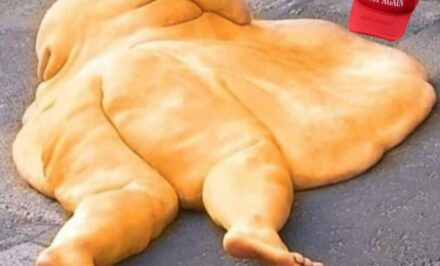
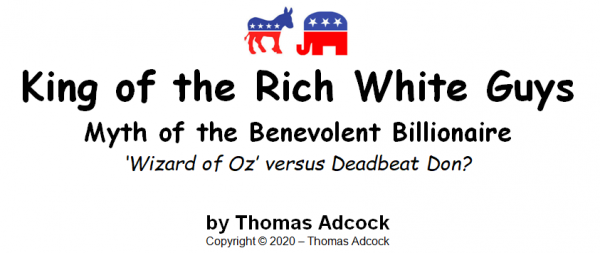
NEW YORK CITY, near America

Lawrence Peter Berra—sportsman and grand master of spoonerisms—warned us of epochal times like these: “It’s déjà vu all over again.” The late Mr. Berra (1925-2015) is affectionately known by generations of New York Yankees fans as “Yogi.” When he can bear to look down from where he resides in Baseball Heaven, I believe he is distressed by what he sees: an unholy number of us Americans’ failure to grasp the caution implied in his most famous lapsus linguae, beguiled as we habitually are by all that glitters gold.
Three billionaires, accompanied by a passel of mere millionaires, now flap their fat-cat wings and puff their chests as candidates for presidency of the United States. They bedazzle us with their plumage, touting such peacockery as evidence of magnificence, born of gumption and shrewdness and all ‘round wisdom. They are savvy, these men with their moneybags, knowing to employ tried and true gags: Don’t rock the corporate boat, salute the flag, keep the faith in noblesse oblige, and above all be afraid of the very word “socialist.”
As Mr. Berra knows, we have seen this movie before. Yogi was a boy during the of presidency of Herbert Hoover (1929-1933), a Republican whose net worth was $80 million (€73.3 million); applying a conservative rate inflation, that means $1.23 billion today (€1.13 billion). Mr. Hoover’s neglect of everyday Americans and their economic needs—along with his neglect of Wall Street crime—produced the stock market crash of 1929, leading to the worldwide Great Depression of the 1930s.
Like billionaires ever since, Mr. Hoover exhibited no trace of irony when he claimed selfless interest in being a servant of We the People.
For some of today’s billionaires, the thrill of vast prosperity has gone flaccid. Life’s too short to be counting money every minute. Perhaps they’re in search of a new, more interesting path for their later years. What’s a bored billionaire to do?
Well—why not purchase the pinnacle of eminence and global power, namely the White House? (Besides, as we learn from the current regime’s banana republic behavior, acquiring the highest office in the land affords excellent opportunity for increasing a billionaire’s outlandish personal wealth.)

In his short-story “Rich Boy,” novelist F. Scott Fitzgerald (1896-1940) wrote:
“Let me tell you about the very rich. They are different from you and me. They [are] soft where we are hard, and cynical where we are trustful, in a way that, unless you [are] rich, it is very difficult to understand. They think, deep in their hearts, that they are better than we are…Even when they enter deep into our world or sink below us, they still think they are better than we are. They are different.”
In the Broadway musical “Fiddler on the Roof,” the most famous number is “If I Were a Rich Man.” It is performed by the central character, the pater familias Tevye, a humble milkman and pious Yiddish speaker living in a Russian shtetl. Tevye led into the piece by telling us the universal, dead-on truth of those in moneyed class: “When you’re rich, they think you really know.”
Nu—step right up, American billionaire fanboys and fangirls!
Who’ll be our next Dear Leader?
The Wizard of Oz or Deadbeat Don? (We shall come to the matter of monikers later herein.)
…I speak of the two politically viable billionaires now running for the presidency: former New York City Mayor Michael Bloomberg for the Democrats, and duplicitous New York real estate mogul Donald J. Trump for the Republicans. Conceivably, this pair of moneybags could square off as presidential standard-bearers for their respective parties.

Meanwhile, a third billionaire is angling for the presidency: Tom Steyer, a Democrat who apparently owns just one necktie, seen at every appearance to date. To his credit, this former Wall Street hedge fund titan is working off career embarrassment with charitable deeds. By the time you read this, he may have dropped from contention for King of the Rich White Guys, the more accurate appellation for America’s head of state, and thrown his support—financial or otherwise—to one of his partisan confrères.
None of these three billionaires are able, or willing, to grok the enormity of simmering economic panic among the polity, especially within the fraught middle classes. The execrable Mr. Trump insists that the masses have never had it so good; late last year, he crowed in one of his oddly capitalized tweets, “We have the greatest economy in the HISTORY of America!”
Dedicated to ignoring anything in print beyond his name affixed to the covers of ghostwritten books, Mr. Trump is unlikely to have read the downbeat findings of financial surveys reported in MarketWatch, the button-down journal owned by Dow Jones & Company:
- One in four Americans hold credit card debt in excess of savings.
- Half of those with credit card debt struggle to keep up with payments.
- Forty percent of Americans are unable to cover emergencies amounting to $400 (€368), either with cash or savings or available credit.
- Nearly one third of Americans have no savings whatever.
- Half of American households either cannot pay for basic needs—food, housing, clothing, medical care—or struggle to do so.
Happily, though, there are signs that our exaltation of the über rich—our trust in their dubious value as government chieftans—may be coming to an end. As journalist and author Anand Giridharadas explained in a February 23 essay for the New York Times, there is “a growing sense that billionaires are not people who just happen to have drifted up from our midst, that in fact they are up there because they are standing on our backs, pinning us down. …[This] is a reflection of how fed up many Americans are with the old narratives about how, with a little pluck and patience they too will rise.”
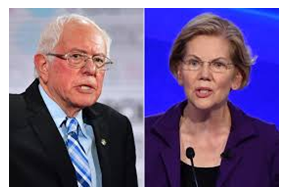
The “fed up” spirit is reflected in the grassroots campaigns of Bernie Sanders and Elizabeth Warren, each seeking the Democratic Party nomination to oppose Mr. Trump in November: We the People are supporting them, with what my late mother in-law called our “little dollars.” Neither Mr. Sanders nor Ms. Warren, affectionately known as Bernie and Liz, accepts corporate funding. Instead, millions of workaday folks from across the country make periodic offerings to their respective campaigns, usually in the range of $5 to $50 (€4.6 to €45.5). Ms. Warren and Mr. Sanders are dubbed “left” or “far left” by corporate media, which applies scarifying opprobrium for Mr. Sanders, who describes himself as a Scandanavian-style democratic socialist. Therefore, “objective” media maligns him as an “avowed” or “self-admitted” socialist. Famously, Mr. Bloomberg the billionaire implied during a Democratic candidates debate that Mr. Sanders’ socialism is, ipso facto, Soviet-style communism.
What seems to rattle the billionaire ilk are Warren-Sanders policy similarities on taxation and health care: both stand for a single-digit surcharge on the incomes of millionaires and billionaires (gasp!); both advocate government-guaranteed health insurance for all Americans—something that the Congress enjoys, if not the rest of us.
—According to the Washington-based Center for Responsive Politics, half the five hundred, thirty-five members of Congress are millionaires. According to the Chicago-based research firm Spectrum, three percent of the nation’s approximately 209,000,000 adults are millionaires.
Notwihstanding Mr. Giridharadas’ uplifting forecast and Bernie & Liz, the Bloomberg and Trump campaign exchequers overflow with big-contributor cash and in-kind donations, much of it from anonymous sources thanks to a 2010 ruling by the Republican-dominated U.S. Supreme Court that canceled most regulations on political donations. The money behind Mr. Bloomberg is his own, which sounds noble but actually puts the presidency up for sale to the highest billionaire bidder. Some, including analysts within the U.S. Intelligence Community, suspect that Kremlin oligarchs supply gobs of support for Mr. Trump.
Whatever the source, Big Money talks, softly and seductively. And Big Media blinds us. In a recent radio interview, Mr. Giridharadas elaborated on how sees the situation:
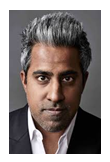
“[T]he future has become a thing that is privately gated and enjoyed and monopolized by very few people, which means that you can be living in an age where extraordinary things are being invented…medical advances are happening, but if you are not in the gated community that enjoys the fruits of the future, you are stuck in 1979. And that’s true as a matter of wages for many people. It’s true as a matter of health access…It’s true as a matter of information access for many people, who are listening to media that [are] distorting their minds. …[W]hat’s at stake in 2020 is we wake up to the idea that either we are going to resign ourselves to living in a country that billionaires rule, or we’re going to actually muster the gumption to remind billionaires that they are living in our country.”
So what are a panicky average Joe and average Jane to think of our unsettling politics? Can they see a way past the familiar lanes established by the Very Rich, or will they face something of Hobson’s choice come November? Let us consider these viable billionaires—
BLOOMBERG
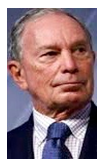
The Democrat Michael Bloomberg was a late entrant to the presidential sweepstakes, currently in the preliminary intra-party, state-by-state “primary” elections between now and late spring; November’s general election looms on the horizon. He is by far the richest of the scrum. As of today, according to February’s mandatory financial accounting to the Federal Elections Commission, the three-term Republican mayor of New York City, from 2002 to 2013, has invested $4.6 million (€4.24 million) of his own money to blanket the nation with television and social media advertisements extolling his City Hall triumphs—there have been a few—and his magnanimity.
Mr. Bloomberg says he is prepared to spend $400 million (€368 million) of his massive fortune on such advertising, a sum that would put a wee, temporary dent in his net worth of $64 billion (€59 billion), according to the annual wealth survey by Forbes Magazine. (Fun fact: If you lived for sixty-four billion minutes, you would die at age 121,766.)
Never in the history of American electioneering has a political advertising blitz proved so effective: Due to the ubiquity and cinematic quality of his TV ads in particular, Mr. Bloomberg vaulted from less than a single-digit preference in major opinion polls six weeks ago to an enviable position today—with party nomination a distinct possibility. Polling progress came despite his extremely rare, extremely orchestrated personal interactions with the “little people,” an appellation coined by his billionaire friend, the unpleasant Manhattan hotelier Leona Helmsley (1920-2007), known to ordinary New Yorkers as the “queen of mean.”
As Mr. Bloomberg strode to his place on a Las Vegas stage for the explosive Democratic candidates debate of February 19, the man with mansions in Manhattan and London and a villa in the tax-haven of Bermuda—a man accustomed to hearing “Very good, sir” multiple times per day—was beaming. In this, his maiden appearance before a national audience, he clearly believed himself the equal of his competitors—Joe Biden, vice president under Barack Obama; former South Bend, Indiana Mayor Pete Buttigieg; Senator Amy Klobuchar, and the aforementioned Bernie and Liz.
Mr. Bloomberg arrived in Las Vegas in the glow of a key media endorsement, that of influential syndicated columnist Thomas Friedman—himself the occupant of a $9.3 million (€8.5 million) manse in suburban Washington and scion by marriage of the Bucksbaum family, whose real estate empire is valued at $2.7 billion (€2.5 billion). The wind-up to Mr. Friedman’s column read, “Bloomberg has the right stuff—a moderate progressive with a heart of gold but the toughness of a rattlesnake.”
Quite possibly, given his rank as ninth richest person in the world, Mr. Bloomberg felt above and beyond the rest of the Democratic field that evening—four measly millionaires (Biden-Warren-Sanders-Klobuchar) plus Mr. Buttigieg, worth a piddling $100,000 (€92,000), according to Forbes. Nevertheless, and in spite of the Friedman anointment, Mr. Bloomberg was verbally bashed, whomped, slashed, and clobbered by his lessers.
Shell-shocked, poor Mr. Bloomberg stumbled off into the Las Vegas night, no doubt seething.
How dare his rivals remind the whole country that he ordered the New York Police Department to spy on Muslim individuals, Muslim-owned businesses, and mosques—without the legal nicety of court-issued surveillance warrants? How dare they question his quick-change position from Republican to Democrat?
How dare they suggest insincerity in his waiting until announcement of candidacy before at long last apologizing for the nearly five million victims of an odious “stop and frisk” policing policy during his 2002-2013 mayoralty—an alleged crime fighting initiative resulting in virtually zero crime prevention, though plenty of humiliation for the detained, overwhelmingly young men of unglamorous races? How dare the audience peasantry shout boo! when he labeled Bernie Sanders’ unremarkable menu of social democratic tenets as “communism?”
—And really (!), how dare they mention dozens of sexual harassment accusations by female employees of his corporate dominion, including an incident in which he allegedly told a pregnant underling to “kill it” or forfeit her job?
As for his touted philanthropy, the New York Times noted that over a mid-February weekend—conveniently prior to the Las Vegas debate—Mr. Bloomberg boosted his single-year charitable spending to $3.3 billion (€3.04 billion), therefore buying the goodwill, read silence, of potential domestic and international critics. Emblematic of this modus operandi, the Times report opened its article by describing how Emily’s List, the prominent feminist advocacy organization and beneficiary of Mr. Bloomberg’s largesse, kept him on its roster of speakers for a fundraiser in spite of his having repeatedly disparaged the global anti-misogynist #MeToo movement.
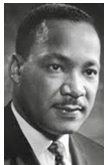
Feminist advocates needed and continue to need his money, even if it comes at the expense of insulting their cause. So long as it burnishes their public persona and allows a measure of control, half-hearted donors the likes of Mr. Bloomberg find their cash welcomed by many worthy institutions. He and his brethren in strategic beneficence might heed the counsel of the civil rights icon and Nobel laureate Martin Luther King Jr. (1929-1968): “Philanthropy is commendable, but it must not cause the philanthropist to overlook the circumstances of economic injustice that make philanthropy necessary.”
In the beloved 1939 movie “The Wizard of Oz,” the namesake character was a bumbling “wizard” of an opulent kingdom, as played by the delightful actor Frank Morgan (1890-1949). An altruistic sort, the wizard rescues a young damsel in distress—a runaway girl named Dorothy Gale, portrayed by the legendary Judy Garland (1922-1969). In the penultimate scene, as Dorothy’s little dog Toto reveals his modus operandi a powerful backstage manipulator, the wizard’s amplified voice booms, “Pay no attention to the man behind the curtain!”
TRUMP

As previous asked in this space, what may be said of Donald John Trump that hasn’t already been said of leprosy? On her TV comedy show “Full Frontal,” comedian Samantha Bee has made a few suggestions: “Tangerine tinted trash can fire”… “Melting hunk of apricot Jell-O”… “Crotch-fondling slab of rancid meatloaf”… “Leering dildo”… “Screaming carrot demon”… “Nasty garbage monster”…“Dick-waving Berlusconi knockoff”… “Fat Elvis”… “The white power movement’s orange ally.”
In view of his lickspittle admiration for and alliance with homicidal Russian authoritarian Vladimir Putin, and the more than three thousand ongoing lawsuits against him filed by contractors he refuses to pay, I would add my own descriptives: “Prezident Trumpushkin”… “Deadbeat Don.”

The Kremlin-backed Republican of Manhattan and Mar-a-Lago, with a Forbes-declared net worth of $3.10 billion (€2.86 billion), has even more partisan flexibility than the Republican/Democrat Michael Bloomberg, his Manhattan neighbor. Prezident Trumpushkin has changed party affiliation six times: He first registered as a Republican in 1987, then switched to the Independence Party of New York in 1999; then to the Democratic Party in 2001, and back to Republican in 2009; then to Independent in 2011, and finally back to Republican in 2012.
•
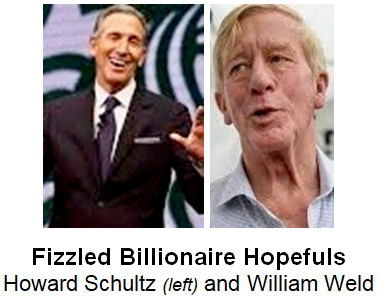
In passing, we should not overlook two other billionaires with dreams of serving the little people: Howard Schultz of New York, the Democratic founder of the Starbucks coffeehouse empire with a net worth of $4.1 billion (€3.73 billion); and William Weld, the popular Republican governor of Massachusetts in the 1990s but now likewise a New Yorker worth $6.7 billion (€6.09) as heir to a family banking fortune.
These men could not be any more different.
Mr. Schultz—raised in the 1950s in a safe, secure, all-white, working-class neighborhood of Brooklyn that he recollects as a life of poverty—lasted but a few months in the Democratic candidate mix. He faltered early with a transparently selfish complaint in January of last year: the party, he repeatedly said, was “shifting to the far, far left.” He meant only one thing: objection to dastardly proposals that would modestly increase the tax bite on people like him—two pennies for every dollar over 50 million, per the Warren plan, or six pennies for every dollar over a billion.
His swan song came shortly thereafter, at a Manhattan bookshop where Mr. Schultz flogged a ghostwritten memoir. He told a disappointingly small audience gathered for the book launch of his contingency plan to run as an independent should he not win the Democratic presidential nomination, “I will have the courage to believe that I can win.” Courage? A man in the audience rose from his chair, jabbed a finger at Mr. Schultz, and shouted, “You rich, arrogant asshole!”
As for Mr. Weld:
Had his once respectable party not surrendered itself to the fearful Cult of Trump, an old-school sane Republican like Bill Weld might well have a chance to free the White House of a pathological narcissist and existential threat to American democracy, cleansing the party in the process. But the Republican establishmentarians dwell so deep in the pit of Trumpian corruption—and are so cowed by the president’s volcanic psychosis, fearful of repercussions from his cult—that it dare not allow Mr. Weld ballot position in a number of the party’s state primaries, lest Deadbeat Don take offense.
—How a single despicable man co-opted a party established in the nineteenth century by Abraham Lincoln—and gained a 90 percent approval rating among contemporary Republican voters, according to a Hill-HarrisX poll published in January—are topics for study by psychologists and sociologists clear to the end of this young century, and likely beyond.
In one of his few appearances on the hustings, early in February in the state of Utah, Mr. Weld said he felt a “moral duty” to do what he could, as candidate or citizen activist, to oppose and defeat Donald Trump.
As usual, his appearance drew no interest from national media. However, the local Salt Lake Tribune was on hand to chronicle Mr. Weld’s rationale for resisting what he characterized as a sick, racist bully, and why he will refuse to vote for his party’s inevitable nominee:
“I think [Mr. Trump] is an unhappy individual, not comfortable in his own skin. He is fighting demons and anger that are coursing inside his head. In some ways, I feel sorry for the guy.
“[H]is striking out after groups and individuals based on ethnicity or religion is just not the American way. And it’s not helpful to us internationally.
“We’ve always been a melting pot. I sometimes think of the Olympics. Ethiopians look like the Ethiopians. The Italians look like the Italians. And the Americans look like everybody. I’m proud of that.”
The rich are different from you and me—sometimes from one another, it would appear by the examples of Messrs. Steyer and Weld. Their careers and personal conduct are exceptions to the arrogant mores of America’s insular billionaire set. As was one of our greatest presidents—Franklin D. Roosevelt (1882-1945), a Democrat whose policies were the forerunners of the Warren-Sanders agenda.
At the time of his 1932 election, Mr. Roosevelt’s net worth was $60 million (€54.6 million), the equivalent today of $17.7 billion (€16.11 billion). His scornful neighbors among the plutocracy of the Hudson River Valley in upstate New York said of him, “That man is a traitor to his class!”
To which Mr. Roosevelt responded, “They hate me…and I welcome their hatred!”
When Franklin Roosevelt died, his funeral cortège was a grieving, days-long event by rail transport, spanning three hundred miles (km 482.8) from Washington to his beloved estate in Hyde Park, where he is buried. In every town along the way, thousands of regular Joes and regular Janes gathered to wave good-bye to their billionaire president.
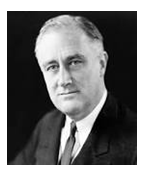
At one town, a newspaper reporter spotted a weeping, elderly man in worn shoes and ragged clothes. Inconsolable, the elderly man’s tears poured into the dusty road at the side of railroad tracks. The reporter asked the man if he knew the president, personally. The weeping man’s response: “No sir, I did not know him. But he knew me.”
—Thomas Adcock is America correspondent for CulturMag
Additional photo credits
Yogi Berra — onthisday.com
F. Scott Fitzgerald — biography.com
Tom Steyer — abcnews.com
Bernie Sanders/Liz Warren — businessinsider.com
Anand Giridharadas — chicagoreader.com
Michael Bloomberg — cnn.com
Martin Luther King Jr. — biography.ocm
Samantha Bee — billboard.com
Donald Trump — democracyguardian.com
Howard Schultz — foxnews.com
Bill Weld — azcentral.com
Franklin Roosevelt — wikipedia


